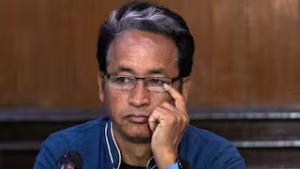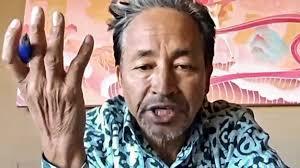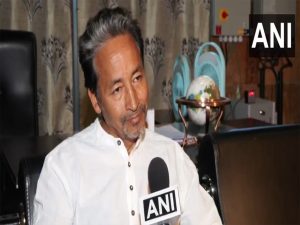Ladakh – The Union Home Ministry executed an FCRA license cancellation on Thursday targeting the Students’ Educational and Cultural Movement of Ladakh (SECMOL), the institution founded by prominent educationist and activist Sonam Wangchuk. This decisive action follows the detection of multiple alleged discrepancies in the organization’s financial accounts, including a fund transfer from Sweden that the ministry claims was “against national interest.”
The FCRA license cancellation comes amid escalating tensions in Ladakh following violent protests that resulted in four deaths and numerous injuries on Wednesday. This timing has raised questions about the connection between political unrest and administrative actions against institutions associated with Wangchuk.
CBI Investigation and Dual Institutional Scrutiny

Shortly before the FCRA license cancellation, the Central Bureau of Investigation launched an inquiry into alleged FCRA violations by both SECMOL and the Himalayan Institute of Alternatives Ladakh (HIAL), both institutions associated with Wangchuk. CBI officials have been stationed in Ladakh for approximately one week, meticulously scrutinizing financial records of both organizations.
While no FIR has been registered yet, the probe follows a complaint from the Union Ministry of Home Affairs regarding alleged receipt of foreign funds without proper FCRA clearance. This investigation provided the foundation for the subsequent FCRA license cancellation action taken by the government.
Specific Financial Violations Cited
The FCRA license cancellation order detailed several specific financial irregularities that prompted government action. During the 2021-22 financial year, Wangchuk allegedly deposited Rs 3.5 lakh into SECMOL’s FCRA account in violation of Section 17 of the Act. SECMOL explained this was sale proceeds from an old bus purchased with FCRA funds on July 14, 2015.
The ministry rejected this explanation, noting the amount was received in cash without proper disclosure. Additionally, an amount of Rs 3.35 lakh was identified as foreign contribution from Sonam Wangchuk personally, but this transaction was not reflected in the FCRA account, violating Section 18 of the Act.
Another red flag leading to the FCRA license cancellation involved a transfer of Rs 54,600 in local funds to FCRA accounts, which SECMOL claimed was a mistake. Most significantly, a foreign contribution from Sweden of approximately Rs 4.93 lakh for creating awareness on migration, climate change, global warming, food security, sovereignty, and organic farming drew ministry scrutiny.
Also Read: Omar Abdullah On Ladakh Violence: Powerful Defence of Congress, Bold Attack on BJP
National Interest and Sovereignty Concerns


The FCRA license cancellation order specifically rejected SECMOL’s arguments that Swedish funds were utilized strictly for educational purposes aligned with organizational objectives. The ministry determined that foreign contributions cannot be accepted for studies on national sovereignty, deeming such funding “against national interests.”
This reasoning formed a crucial justification for the FCRA license cancellation, reflecting the government’s position that certain topics—particularly those involving national sovereignty—should not be subject to foreign-funded research or awareness programs, regardless of educational intent.
Wangchuk’s Response and Additional Legal Challenges


Responding to the FCRA license cancellation, Wangchuk clarified that the questioned transactions were “payments for knowledge-sharing services with the UN, a Swiss university, and an Italian organization, with taxes duly paid.” He revealed that the CBI team initially focused on the 2022-24 period but later sought financial details from earlier years, including 2020 and 2021.
Wangchuk noted that investigators even visited their school, which was not mentioned in the original complaint. He emphasized that both HIAL and SECMOL provide free education and stipends to underprivileged students in Ladakh, positioning the FCRA license cancellation as potentially harmful to vulnerable populations.
Pattern of Actions Against the Activist
The FCRA license cancellation represents just one element in a series of actions against Wangchuk in recent months. The activist detailed facing a sedition case, a land lease dispute related to HIAL, income tax notices, and a revived complaint about unpaid laborers from four years ago.
“It’s like guns blazing from all sides,” Wangchuk stated, expressing concerns about his personal safety. He warned that authorities might be building a case to detain him under the Public Safety Act for two years, noting, “I am ready for that, but Sonam Wangchuk in jail may cause them more problems than free Sonam Wangchuk.”
Political Context and Violence Attribution
The FCRA license cancellation occurred against the backdrop of violent protests in Ladakh demanding statehood and constitutional protections. The BJP-led Centre has blamed Wangchuk for inciting Wednesday’s violence, which resulted in the burning of a BJP office and multiple vehicles in Leh.
However, Wangchuk attributed the violent protests to youth frustration over “six years of unemployment and unmet promises at every level,” rejecting government accusations of personal responsibility for the unrest. This dispute over causation has intensified the political dimensions of the FCRA license cancellation.
Implications for Educational Institutions
The FCRA license cancellation under Section 14 of the FCRA took immediate effect, potentially disrupting SECMOL’s operations and its ability to serve underprivileged students in Ladakh. The action raises broader questions about foreign funding regulations for educational and cultural organizations, particularly those led by activists involved in political movements demanding greater autonomy or statehood for their regions.

